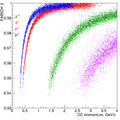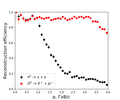SctParSim (Aurora)
(Created page with "= SctParSim = A parametric simulation is a tool to receive a detector response without detailed description of interaction of particles with matter. The simulation is the part...") |
(→Drift chamber) |
||
| (8 intermediate revisions by one user not shown) | |||
| Line 1: | Line 1: | ||
= SctParSim = | = SctParSim = | ||
| − | A parametric simulation is a tool to receive a detector response without detailed description of interaction of particles with matter. The simulation is the part of the Aurora project, which is a software suit for SCTF. | + | A parametric simulation is a tool to receive a detector response without detailed description of interaction of particles with matter. The simulation is the part of the Aurora project, which is a software suit for SCTF. |
Implemented detector subsystems: | Implemented detector subsystems: | ||
| Line 8: | Line 8: | ||
* muon system | * muon system | ||
| − | The parametric simulation yields the detector response in the SCT EDM format thus allowing to analyze its result in the same manner as the result of the full simulation. | + | The parametric simulation yields the detector response in the SCT EDM format thus allowing to analyze its result in the same manner as the result of the full simulation. The tracker and the calorimeter smear particle parameters according |
| + | to a Gaussian distribution, while the FARICH PID and the muon subsystem use for that purpose the results of a pre-conducted standalone full Geant4 simulations. | ||
| − | How-to use the parametric simulation is demonstrated [https://ctd.inp.nsk.su/wiki/index.php/SCT_parametric_simulation here] | + | '''How-to use the parametric simulation''' is demonstrated [https://ctd.inp.nsk.su/wiki/index.php/SCT_parametric_simulation here] |
== Detector configuration == | == Detector configuration == | ||
| − | The detector parameters can be changed in the run script | + | The detector parameters can be changed in the run script. |
| − | The detector parameters and their default values | + | The detector parameters and their default values are presented below. |
=== SctParSimAlg === | === SctParSimAlg === | ||
| Line 195: | Line 196: | ||
| The path to the file with response histograms of muon system (pion) | | The path to the file with response histograms of muon system (pion) | ||
| ./g4beamline_pi_plus_100k_parse.root | | ./g4beamline_pi_plus_100k_parse.root | ||
| − | |} | + | |} |
| − | + | ||
== Parameterization == | == Parameterization == | ||
| Line 203: | Line 203: | ||
The track resolution is described [https://ctd.inp.nsk.su/wiki/index.php/Drift_chamber here]. | The track resolution is described [https://ctd.inp.nsk.su/wiki/index.php/Drift_chamber here]. | ||
| − | The parametric simulation has two options in the tracker to the particle identification: an ionisation clusters counting (dNcl/dx) and dE/dx. The model of calculation the specific number of ionization clusters is taken from a TraPID option by F. Gracagnolo ([https://indico.lal.in2p3.fr/event/4902/contributions/17030/attachments/13603/16389/SCTFDrift_Chamber.pdf The presentation on "Joint Workshop on Future tau-charm factory" in December 4--7, 2018]). An energy losing is calculated using the resolution model from BaBar experiment | + | The parametric simulation has two options in the tracker to the particle identification: an ionisation clusters counting (dNcl/dx) and dE/dx. The model of calculation the specific number of ionization clusters is taken from a TraPID option by F. Gracagnolo ([https://indico.lal.in2p3.fr/event/4902/contributions/17030/attachments/13603/16389/SCTFDrift_Chamber.pdf The presentation on "Joint Workshop on Future tau-charm factory" in December 4--7, 2018]). An energy losing is calculated using the resolution model from BaBar experiment. |
| − | + | ||
| − | + | ||
| − | + | ||
| − | + | ||
<gallery> | <gallery> | ||
| Line 293: | Line 289: | ||
* FARICHHits | * FARICHHits | ||
| − | |||
| − | |||
** time | ** time | ||
** beta | ** beta | ||
Latest revision as of 16:52, 11 June 2022
Contents |
[edit] SctParSim
A parametric simulation is a tool to receive a detector response without detailed description of interaction of particles with matter. The simulation is the part of the Aurora project, which is a software suit for SCTF.
Implemented detector subsystems:
- drift chamber
- FARICH PID system
- calorimeter
- muon system
The parametric simulation yields the detector response in the SCT EDM format thus allowing to analyze its result in the same manner as the result of the full simulation. The tracker and the calorimeter smear particle parameters according to a Gaussian distribution, while the FARICH PID and the muon subsystem use for that purpose the results of a pre-conducted standalone full Geant4 simulations.
How-to use the parametric simulation is demonstrated here
[edit] Detector configuration
The detector parameters can be changed in the run script. The detector parameters and their default values are presented below.
[edit] SctParSimAlg
| Name to change parameter | Description | Default value |
|---|---|---|
| B | Detector magnetic field | 1.5 |
| mostProbMass | The mass of most probable particle | 0.13957 |
[edit] TrackSystemTool
| Name to change paramater | Description | Default value |
|---|---|---|
| trackRhoMin | Inner radius of barrel tracker, m | 0.1 |
| trackRhoMax | Outer radius of barrel tracker, m | 0.8 |
| trackZMin | Inner z coordinate of endcup tracker, m | 0 |
| trackZMax | Outer z coordinate of endcup tracker, m | 1 |
| trackMinPt | Minimum momentum, GeV | 0.05 |
| trackPtProb | Registration probabilities for different momentum, {GeV, prob} | {{0.1, 0.8}, {0.3, 0.9}, {1, 0.95), {10, 0.99}} |
| trackRadLen | Radiation length in the track system, m | 187 |
| trackResParPT | Parameterizaton parameters for xy projection | 0.00212 |
| trackResParPZ | Parameterization parameters for z projection | {0.001281, 0.00308} |
| trackLayerAx | The radius of layers anf the location radius of the anod layers, mm | {{6.306, 217.306}, {6.644, 227.1}, {7.165, 246.906}, {6.564, 341.938}, {6.794, 352.06}, {7.14, 371.992}, {7.388, 382.95}, {6.651, 467.57}, {6.823, 477.718}, {6.968, 488.097}, {7.12, 498.701}, {7.274, 509.535}, {6.768, 636.322}, {6.898, 646.501}, {7.007, 656.957}, {7.121, 667.581}, {6.791, 750.730}, {6.902, 761.027}, {6.995, 771.472}, {7.091, 782.061}} |
| trackLayerSt | The radius of layers and the location radius of the stereo layers, mm | {{6.473, 280.136}, {6.747, 290.136}, {7.182, 310.863}, {7.486, 321.938}, {6.603, 405.941}, {6.799, 416.04}, {7.104, 436.741}, {7.314, 447.606}, {6.741, 533.35}, {6.859, 543.615}, {7.026, 554.088, {7.161, 564.762}, {6.778, 584.801}, {6.919, 595.108}, {7.039, 605.606}, {7.163, 6169.289}, {6.746, 689.948}, {6.865, 700.185}, {7.041, 720.09}, {7.165, 730.775}} |
[edit] FARICHSystemTool
| Name to change paramater | Description | Default value |
|---|---|---|
| farichRhoMin | Inner radius of barrel FARICH system, m | 0.82 |
| farichRhoMax | Outer radius of barrel FARICH system, m | 0.9 |
| farichZMin | Inner z coordinate of endcup FARICH system, m | 1.02 |
| farichZMax | Outer z coordinate of encup FARICH system, m | 1.273 |
| farichHoleR | Hole radius of FARICH system | 0.3 |
| parSimFarichFileName | The path to the file with response histograms of FARICH | ./pi_ms_f1_mppc2_px3_d200_mla4_graph2d.root |
[edit] CaloSystemTool
| Name to change paramater | Description | Default value |
|---|---|---|
| caloRhoMin | Inner radius of barrel calorimeter, m | 1.09 |
| caloRhoMax | Outer radius of barrel calorimeter, m | 1.55 |
| caloZMin | Inner z coordinate of endcup calorimeter, m | 1.293 |
| caloZMax | Outer z coordinate of endcup calorimeter, m | 1.86 |
| caloCosthmax | Maximum cosine | 0.9 |
| caloClSize | Calorimeter cluster size, m | 0.045 |
| caloClSizeEGamma | Calorimeter cluster size for gamma, m | 0.15 |
| caloEMinBarrel | Minimal energy, GeV | 0.015 |
| caloEMinEndcup | Minimal energy, GeV | 0.015 |
| caloResPar | Parameterization parameters | {1.34e-2, 0.066e-2, 0.0, 0.82e-2} |
[edit] MuonSystemTool
| Name to change paramater | Description | Default value |
|---|---|---|
| muonRhoMin | Inner radius of barrel muon system, m | 1.87 |
| muonRhoMax | Outer radius of barrel muon system, m | 2.15 |
| muonZMin | Inner z coordinate of endcup muon system, m | 1.88 |
| muonZMax | Outer z coordinate of endcup muon system, m | 2.16 |
| parSimMuonFileNameMu | The path to the file with response histograms of muon system (muon) | ./g4beamline_mu_plus_100k_parse.root |
| parSimMuonFileNamePi | The path to the file with response histograms of muon system (pion) | ./g4beamline_pi_plus_100k_parse.root |
[edit] Parameterization
[edit] Drift chamber
The track resolution is described here.
The parametric simulation has two options in the tracker to the particle identification: an ionisation clusters counting (dNcl/dx) and dE/dx. The model of calculation the specific number of ionization clusters is taken from a TraPID option by F. Gracagnolo (The presentation on "Joint Workshop on Future tau-charm factory" in December 4--7, 2018). An energy losing is calculated using the resolution model from BaBar experiment.
[edit] FARICH PID system
The FARICH PID system works using the results of the full GEANT4 simulation. The system output is the particle speed and number of photons.
[edit] Calorimeter
The calorimeter resolution is  , the coefficients (e0, e1 etc.) are taken from the D. Epifanov presentation on Super C-Tau factory workshop in May 27, 2018.
, the coefficients (e0, e1 etc.) are taken from the D. Epifanov presentation on Super C-Tau factory workshop in May 27, 2018.
There are two cluster sizes to gammas / electrons and other particles.
[edit] Reconstruction
The cross-linking data obtained by the track system and the calorimeter is implemented. This is implemented taking into account the geometric intersection of the calorimeter clusters.
The algorithm for the cross-linking data obtained by the track system and the calorimeter:
- union of geometrically intersecting calorimetric clusters
- finding a match between calorimetric clusters and tracks
- recalculating cluster characteristics (time, energy, cluster size, conversion point)
[edit] Muon system
The muon system works using the results of a reconducted stand-alone simulation on G4BeamLine. The system is a cylinder of eight absorber and sensitive polystyrene layers. The absorber is iron.
[edit] Output collection
The output ROOT-file contains:
- allGenParticles - MC particles
- pdgId
- charge
- vertex - x, y, and z coordinates
- p4 - momentum (px, py, pz) and mass
- Particles - the particle characteristics after the parametric simulation
- pdgId
- charge
- vertex - x, y, z coordinates
- p4 - measured momentum (px, py, pz) and the most probability particle mass
- dedx
- dedx_err
- dncldx - cluster counting
- dedxPid
- dncldxPid
- farichPid
- muPid
- TrackState - the helix characteristics (the track)
- phi
- theta
- qOverP
- d0
- z0
- referencePoint - x, y and z coordinates
- CaloClusters
- energy
- time
- position - x, y and z coordinates of the calorimeter entry point
- MuonHits
- layer - the last layer that registered a particle
- FARICHHits
- time
- beta
- beta_err
- nphe0
- nphe
The more characteristics have intuitive names.





